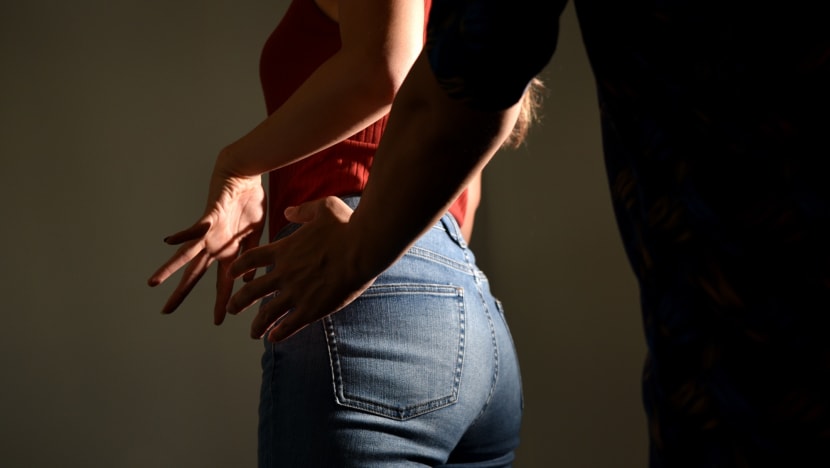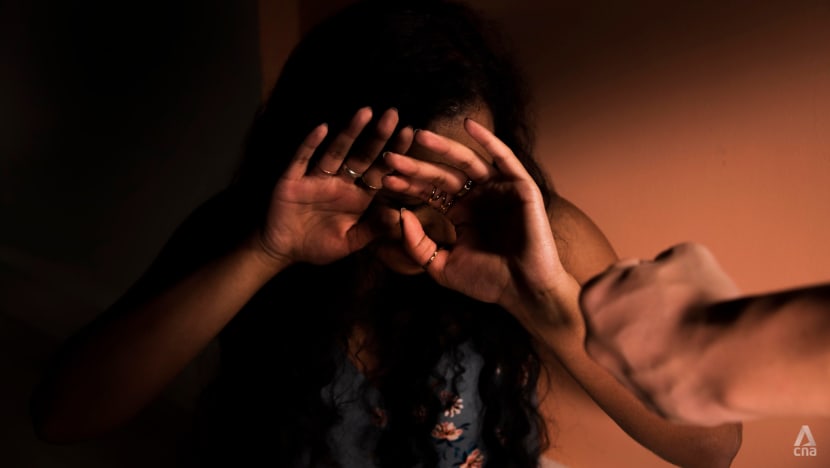Commentary: We harp on false sexual assault accusations despite evidence to the contrary
A doctor’s acquittal after a woman admitted to lying about molest has provoked misogynistic narratives about sexual assault victims, which do not match facts on the frequency of false reporting, says AWARE’s Shailey Hingorani.

Photo illustration of a man committing molest. (Photo: CNA/Jeremy Long)
SINGAPORE: The spectre of false sexual abuse accusations looms large in cultural narratives about sexual violence, with public anxiety about the ease and frequency of false reporting remaining high.
Although the evidence on false allegations has repeatedly failed to support that fear, many continue to rue that #MeToo’s political dictum of “believe women” has gone too far.
Case in point: When a Singapore anaesthetist was acquitted of molesting a 32-year-old woman, after she admitted at trial that she was lying, commentators took to banging the drum, claiming that false allegations are widespread and that all sexual assault complaints - or gender equality movements, even - should be treated with scepticism.
“Women can be vile creatures too,” a Twitter user tweeted at AWARE after news of the above case broke. “That is why I have never supported women's rights.”
A comment on Facebook reads: “Singapore is a country whereby women have much higher status than men and can always play victim to garner sympathy.”
A LOT OF US THINK MANY SEXUAL HARASSMENTS CLAIMS ARE FALSE
In an Ipsos survey of 1,019 Singaporeans and PRs in 2019, four in 10 agreed with the statement that false accusations of sexual harassment are becoming more common in Singapore. Forty-one per cent of all Singaporeans agreed or strongly agreed that false accusations of sexual harassment are a bigger problem in our society than unreported acts of sexual harassment.
Lest you write this off this as the conservative beliefs of an older population, the survey found that this perspective is more prevalent among younger and middle-aged Singaporeans, aged 18 to 49 years.
On the other hand, under-reporting of sexual abuse remains pervasive. Seven out of 10 clients of AWARE’s Sexual Assault Care Centre (SACC) do not file an official report.
Studies in the US have found that anywhere between 6 per cent and 38 per cent of men admit to sexually coercive behaviour. Yet it is rare to see proportionate uproar about the number of perpetrators who get away with sexual abuse.
Of course, “believe women” has never meant “believe all women categorically, no questions asked”. But the knee-jerk dismissal with which women’s stories have historically met needs to be put to bed.
So what should we make of the burgeoning conviction surrounding false accusations? How do we answer those who would cite this recent case as evidence of a more widespread conspiracy?
FALSE ACCUSATIONS ARE EXCEEDINGLY RARE
Research for the United Kingdom’s Home Office in 2005 – believed to be the most comprehensive study of its kind to date – suggests only 4 per cent of cases of sexual violence reported to the UK police are found or suspected to be false. (Of the 216 assault complaints classified as false, only six led to arrest, and only two led to actual charges.)
Studies in Europe and in the US put these rates at between 2 per cent and 6 per cent.
In Singapore, according to the Ministry of Home Affairs, of the 250 reported cases of serious sexual crimes (rape and sexual assault by penetration) a year from 2014 to 2018, police charged or warned the complainants for making false reports in only 10 cases - comparable to the rate in the UK.
It’s important to note that, although the two are frequently lumped together, these cases shouldn’t be confused with cases that don’t result in prosecution because of lack of evidence. In fact, experts suggest that the number of false reports may themselves be inflated because of the way crimes are sometimes classified around the world.
In the UK, for example, police sometimes record cases as “no crime” or “unfounded” because of insufficient corroborating evidence. As many types of sexual harassment - flashing, verbal harassment for example - occur without leaving any definitive evidence, one would expect this investigative outcome to be fairly common.
Yet this does not square with the deliberate, targeted deception that false accusers supposedly practise, as popular imagination would have it.
(How do videos and photos of innocent victims end up on disgusting illicit Telegram chats? CNA's Heart of the Matter dives into how one young woman infiltrated those groups and reached out to victims:)
Although this doesn’t appear to be a problem with the crime data in Singapore, the conflation of cases of false accusations and cases without sufficient evidence continues to hold sway in public opinion. This confusion may be one of the reasons why false accusations are perceived by the public as much higher than they actually are.
FALSE ACCUSATIONS DON’T JUST HAPPEN IN CASES OF SEXUAL ASSAULT
There’s no evidence that the rate of false accusations of rape is higher than that of other crimes. However, false sexual abuse accusations receive disproportionately higher levels of attention than other types of false accusations.
Take, for example, false accusations involving theft. How many of us remember the 72-year-old man who, just a month ago, was investigated for a false report claiming he had been robbed by two unknown men? Or the 48-year-old man charged with providing false information to the police when he claimed that one of his workers had stolen S$2,800 in cash from a co-worker?
In those cases, irrational generalisations don’t run wild - we would be laughed at if we extrapolated from these that significant numbers of men who report theft are lying about it or doing it for attention.
But when it comes to sexual violence, a crime that is heavily gendered, with victim-survivors being overwhelmingly female, the lingering stain of misogyny is hard to scrub away. Tropes about lying, untrustworthy women have long been deployed to discredit those who would challenge the status quo.
Accordingly, stereotypes about false accusers condition us to imagine them as women. In reality, though, men can and do make false reports too. In 2019, a 34-year-old man provided false information to an investigation officer, saying that his 50-year-old Singaporean boyfriend had force-fed him a pill and raped him at their home while he was unconscious. Yet we tend to harp on cases of women making false accusations.
THE HARM OF THE FALSE REPORTING MYTH
Such an imagined prevalence of false accusations has real-world effects. For one, it impedes justice.
There are a variety of reasons why women choose not to officially report a rape or sexual assault, but the fear of not being believed is often a prominent reason.
In an AWARE-Ipsos survey on workplace sexual harassment published in January, 20 per cent did not report their sexual harassment because they feared no one would believe them - a fear fuelled by social media comments harping on about false accusations.
Second, incorrect and unreliable assumptions about false complaints could create biases and sway how rape allegations are managed if we are not careful.

Research has investigated the chasm between the high rates at which police officers believe false allegations to be made, and the actual low rates of false allegations. A 2005 study found that police officers in the UK believed half of cases to be false, a sharp contrast from the more accurate rate of 4 per cent (as per the Home Office study).
LEGAL FRAMEWORKS PROTECT AGAINST FALSE ACCUSATIONS
Making an accusation of sexual abuse is often onerous and traumatising for survivors with plenty of hard evidence on hand.
Considering this, it’s mind-boggling why anyone would entertain the idea that many women are expending significant effort, time and money, and subjecting themselves to cross-examination, investigations that can last well over a year, and public backlash, for some sort of ill-defined personal gain.
The fact is that the criminal justice system in Singapore is well-positioned to weed out false reports, no matter how few they may be. The police take a serious view of the waste of public investigative resources.
For giving false information to a public servant, one can be jailed for up to a year and fined up to S$5,000.
In addition to criminal consequences for complainants, there are also potential civil consequences. The person falsely accused can sue the complainant for defamation on the basis that their reputation was damaged by their false allegations.
False accusations of sexual abuse do happen, and when they do, real harm is done to the accused. Nobody should be put through the trauma of defending themselves against an act they did not commit.
But looking at the facts, we have to keep our imaginations in check and not succumb to bogeyman narratives that allow abusers to escape accountability for their actions.
Dr Yeo Sow Nam, the anaesthetist acquitted earlier this week, himself spoke to the need to treat all reports of sexual assault with sensitivity and rigour.
Referring to “the good, necessary and difficult work of ensuring access to justice for real victims of sex crimes, many of whom already hesitate to accuse their attackers publicly”, the doctor hoped that his verdict would not “discourage real victims of sex crimes from coming forward, or set back the moral agenda in their favour".
The vast majority of sexual abuse accusations can and should be taken seriously. That remains the foundational premise with which we should handle such cases.
Shailey Hingorani is head of research and advocacy at AWARE.



















